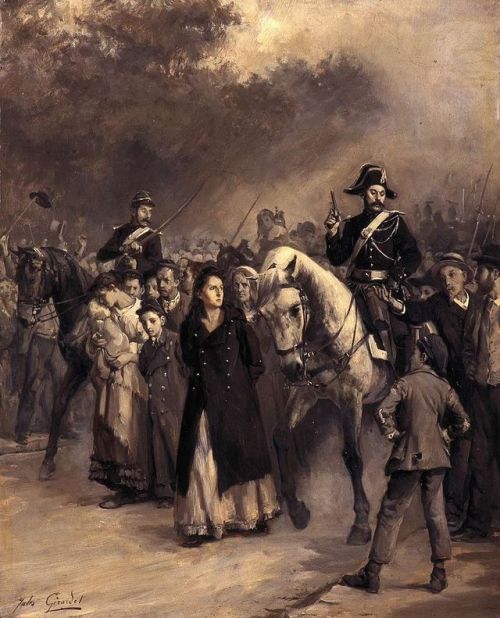quercusfloreal:sieclesetcieux: rhapsodyofirony:Arrestation de Louise Michel (the Arrest of Louise
quercusfloreal:sieclesetcieux: rhapsodyofirony: Arrestation de Louise Michel (the Arrest of Louise Michel), Jules Girardet. Meet the real-life Enjolras : Louise Michel. Most people know about the role she played, as a libertarian socialist (later converted to anarchism), during the Commune of Paris, in 1871, during which she opened a school and advocated for the education of the poorest children of Paris, fed starving Parisians, but also fought with her comrades in arms at the Hotel de Ville. The popularity of the “black flag” among anarchists can be attributed to her using it first, to dissociate herself from the “authoritarian, parliamentary socialists” : “ Plus de drapeau rouge mouillé du sang de nos soldats. J’arborerai le drapeau noir, portant le deuil de nos morts et de nos illusions” (”No more red flag wet with our soldiers’ blood. I will carry the black flag, to mourn the death of our men and our illusions”) Described as a “terrible woman” by her detractors, for her fierce political activism and her radical feminism, she gained the respect and friendship of (mainly left-wing) personalities and politicians such as : Georges Clemenceau (future president of the council, and who intervened various times to bail her out), Paul Lafargue (son-in-law of Karl Marx, and an essayist himself), Marie and Théophile Ferré (brother and sister, fellow Communards), Jules Vallès (writer and journalist), and…Victor Hugo. Concerning her friendship with good old Victor, it started when she moved to Paris in 1850 : Louise, an admirer of his work, wrote poems that she sent to Victor under the pen name of Enjolras. Victor, on the other side, chose her as a subject of a few poems he wrote on the theme “women of tragic or exceptional destiny” (Viro Major). Their correspondence lasted until 1879. The alias Enjolras stayed with her, and was used by her comrades during la Commune. Louise Michel also wrote a beautiful, chilling, sublime poem in which she expresses kinship to Saint-Just, much like I would. It was written in January 1861, ten years before the Commune. She was yet to turn 31 years old. Here it is with my rough translation to English (in italics, after each verse). I’ve carried this poem with me for over a decade. Afficher davantage I love this woman so much !She surrendered to save her arrested mother. Never denied her actions during her trial and ask to join his allies condemned to death. “If you’re not cowards, kill me” she said to the judges.She never gived up. Every time she was released from jail, she keep up the fight. -- source link
#history

